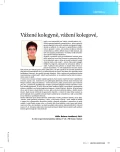-
Medical journals
- Career
The cognitive disorder is not always dementia
Authors: B. Jurašková; J. Zajíc; D. Hrnčiariková
Published in: Geriatrie a Gerontologie 2017, 6, č. 2: 91-93
Category: Case Reports
Overview
In recent years, we have seen a growing number of dementia patients. Testing for a cognitive disorder in terms of reduction in cognitive function that accompanies this illness is not always evidence that the issue at play is dementia. The deterioration of cognition may be a symptom of many other illnesses. The cognitive disorder may not be irreversible. Proper diagnosis can not only reduce the number of patients with so-called dementia, but also improve the lives of our seniors.
KEYWORDS:
dementia – cognitive impairment – general deterioration – dehydration
Sources
1. Kalvach Z, Zadák Z, Jirák R a kol. Geriatrie a gerontologie. Praha: Grada Publishing 2004; 443–589.
2. Jorm AF. Is depression a risk factor for dementia or cognitive decline? A review. Gerontology 2000; 46(4): 219–227.
3. Svačina Š, Jurašková B, Karen I, Šmahelová A, Olšovský J, Červený R, Holmerová I, Pelikánová T. Doporučené postupy v léčbě starších pacientů s diebetes mellitus v ČR. DMEV 2/2013; 16 : 82–89.
4. Kalvach Z, Zadák Z, Jirák R a kol. Geriatrické syndromy a geriatrický pacient. 1. vyd. Praha: Grada Publishing 2008.
Labels
Geriatrics General practitioner for adults Orthopaedic prosthetics
Article was published inGeriatrics and Gerontology

2017 Issue 2-
All articles in this issue
- Active approach to acute hospitalised geriatric patient for preventing muscle loss and self-sufficiency
- Polypharmacy and malnutrition in elderly patients
- Delirium – new knowledge and experiences for clinical practice
- Palliative care at post-acute care facilities
- Non-image forming effects of light: chronobiologic therapy
- The cognitive disorder is not always dementia
- Pulmonary nocardiosis in a geriatric patient
- Geriatrics and Gerontology
- Journal archive
- Current issue
- Online only
- About the journal
Most read in this issue- Delirium – new knowledge and experiences for clinical practice
- Palliative care at post-acute care facilities
- Pulmonary nocardiosis in a geriatric patient
- The cognitive disorder is not always dementia
Login#ADS_BOTTOM_SCRIPTS#Forgotten passwordEnter the email address that you registered with. We will send you instructions on how to set a new password.
- Career

